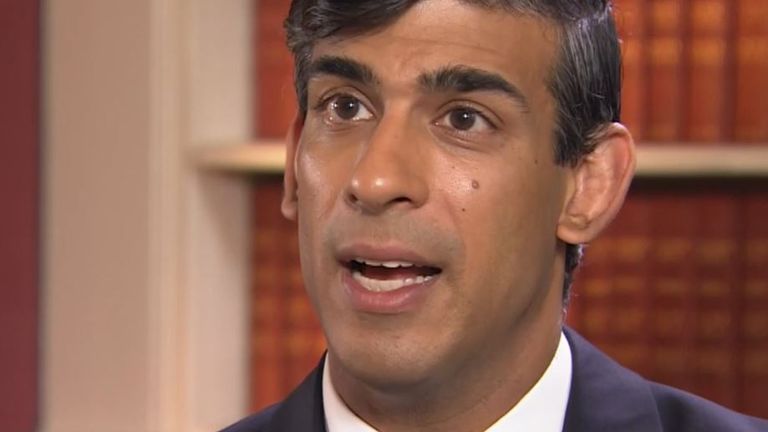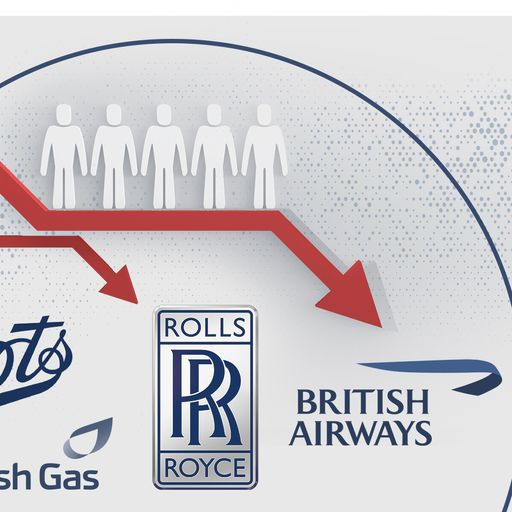Coronavirus: Largest UK recession on record - official figures
The ONS charts the effects of the deep freeze imposed on the economy amid fears a crisis for employment has barely begun.
Wednesday 12 August 2020 11:37, UK
The UK has been tipped into the "largest recession on record", according to official figures charting the impact of the coronavirus crisis on the economy.
The Office for National Statistics (ONS) reported that the enforced hibernation of activity through the COVID-19 lockdown meant gross domestic product (GDP) slumped by 20.4% in the second quarter of the year following a dip of 2.2% during the first three months of 2020.
It determined that, by the end of June, the economy was a sixth below February's pre-crisis level - as a monthly recovery for growth, which began in May, gathered further momentum during June.
April proved the biggest drag as it was the first full month of curbs on non-essential businesses and services but was followed by month-on-month growth of 2.4% in May and 8.7% during June as restrictions were relaxed.
The effects of the lockdown have stoked a crisis for employment, with separate figures released on Tuesday showing the biggest slump for employment for more than a decade in the April to June quarter.
Data covering July showed 730,000 fewer people on payrolls since the lockdown started.
John Lewis, Boots, M&S, British Airways, WH Smith and Debenhams have been among a wealth of well-known names cutting jobs to date, to save costs.
In its update on the economy on Wednesday, the ONS also pointed to a record fall in productivity during the second quarter of the year, as more than nine million workers were placed on furlough.
It measured that output per worker fell by a fifth compared with the first three months of 2020.
ONS deputy national statistician Jonathan Athow said: "The recession brought on by the coronavirus pandemic has led to the biggest fall in quarterly GDP on record.
"The economy began to bounce back in June, with shops reopening, factories beginning to ramp up production and house-building continuing to recover.
"Despite this, GDP in June still remains a sixth below its level in February, before the virus struck.
"Overall, productivity saw its largest-ever fall in the second quarter. Hospitality was worst hit, with productivity in that industry falling by three-quarters in recent months."
The plunge in GDP currently leaves the UK second only to Spain in suffering the worst hit to output, among major economies, during the first six months of the year.
At 22.1% it is double the impact witnessed in the US.
Economists have pointed to the UK being particularly exposed because of its reliance on consumer spending - a point Rishi Sunak was quick to make during an interview with Sky News in which he defended the scale of the downturn but warned there was worse to come for employment.
The Chancellor said: "I said (months ago) hard times were coming and today's numbers show that hard times are here.
"Hundreds of thousands of people have already lost their job and many more will.
"What I would say though is difficult decisions do lie ahead for all of us but I want to reassure people we will get through this and nobody will be left without hope and opportunity."
He signalled the government had put lives first but added: "It's not a sustainable situation to have vast swathes of our economy essentially shut down.
"And that's why we have been able to successfully reopen bits, and do it in a safe way.
"And as people get back to going shopping, or going out for a meal, or indeed getting back to their office, they will see that it's a new normal, it's a safe normal."
In response, Labour accused the government of bungling the battle against COVID-19.
Shadow chancellor Anneliese Dodds tweeted: "We've already got the worst excess death rate in Europe - now we're on course for the worst recession too.
"That's a tragedy for our country and it's happening on the PM's watch. A downturn was inevitable after lockdown - Johnson's jobs crisis wasn't."
While the worst may be over for economic growth, it is inevitable that the worst is yet to come for jobs.
Last week, the Bank of England forecast a better-than-expected pick-up in growth but said it would take until the final quarter of 2021 for the economy to regain its previous size.
It is expecting the unemployment rate, currently at 3.9% to hit 7.5% by the year's end as the furlough scheme is wound down.
Analysis: 'The scale of this economic contraction is unlikely ever to be repeated'
By Ed Conway, economics editor
So it's official.
Britain is in recession. Except that this is unlike any recession any of us have experienced. It's the deepest recession in modern British history. It's the deepest of any other leading industrialised economy (only Spain's economy shrank by more in the first half of 2020).
Indeed, this is the deepest recession since the invention of gross domestic product as an economic concept back in the 1930s.
In one sense the fall is not surprising: we were in lockdown for most of the second quarter, so it was always likely that economic output would fall sharply during that period. The lockdown began in the first quarter and intensified in the second, and given the standard definition of a recession is two successive quarters of contraction, it was plain a while back that we would face a recession.
Even so, the scale of it is quite something: a 20.4% fall in output in the second quarter - almost double the fall in most other advanced economies. It puts UK economic output back to the level it was in 2003: 16 years of growth and prosperity wiped out in the space of six months.
Except that's not quite right, because this is no normal recession in another respect too. Mostly, recessions are thrust upon countries and governments. This recession was, at least in part, a confected one: a lockdown designed to clamp down on activity and bring COVID-19 under control. And the good news is that much of that economic output should come back pretty quickly.
Indeed, delve deeper into the figures released by the Office for National Statistics today - into the month-on-month growth rates, and you can see the early signs of that rebound.
Monthly GDP actually rose by 8.7% in June, the biggest monthly increase since records began. It's nowhere near enough to bring the level of income across the economy back to where it was before COVID-19 struck - indeed it still leaves GDP 17.2% shy of its pre-crisis level. Still: for those who hope this will be V-shaped recovery, with a very quick rebound back to normality, it is a start.
Economic statistics are mostly the equivalent of a rear-view mirror. These GDP numbers are history, albeit recent history - a cliff edge and a canyon we are now pulling out of. The abiding question now is what happens next. Does the UK economy recover, or does economic activity drag on at a weaker rate for the foreseeable future? And, inextricably linked, what happens if there's a second surge in COVID-19 infections: does it prompt another lockdown or semi-lockdown, with all the associated consequences?
Most economists suspect that whatever happens, unemployment will rise even more sharply than after the financial crisis in 2008, making this the biggest jobs crisis since the 1980s. In the end, that statistic - unemployment - may prove more significant and meaningful than a double digit fall in GDP.
The scale of this economic contraction is unlikely ever to be repeated. It will take some time before we understand the precise shape of the curve: the ONS constantly revises these numbers over time, so it might be that the fall was less deep, or maybe deeper. Is this the worst recession since 1921 or since the early 18th century? Only time will tell.
It is likely that it is an unusually short lived recession, if only because the fall was so sharp that any return to a semblance of normality would involve an increase in output.
Even so, it is a baleful moment for the UK. It might just be a statistic, it might not be the best measure of personal wellbeing or equality, but GDP is still about the most comprehensive metric of a country's welfare. It is simply the sum total of everything we buy, sell or earn. And we have never seen it collapse like this before.








